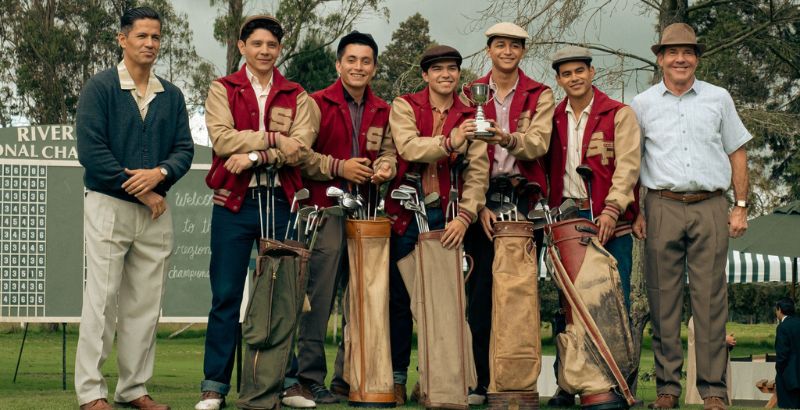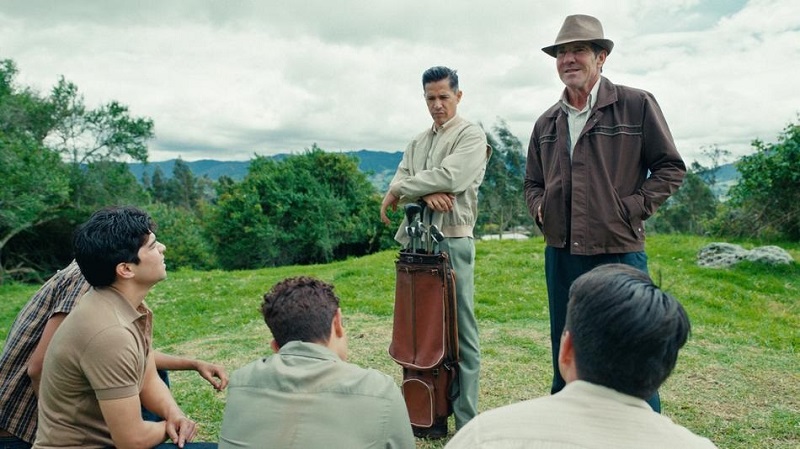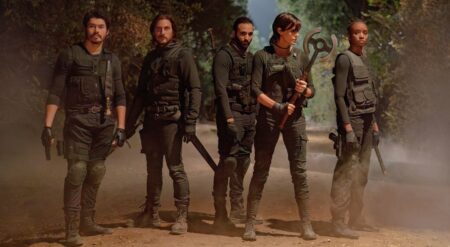Golf is for white people. That’s something I’ve thought as long as can remember. It makes me think of country clubs where people who look like me only appear in to clean or landscape. So when I heard about The Long Game, I was worried. I expected it to be another white savior story, after marketing material put Dennis Quaid at the forefront. In fact, I only gave it a chance because of its majority Latino cast – I am a Tejana after all. And well, I’m glad I did.
Screening at SXSW Film & TV 2023, directed by Julio Quintana and written by Quintana, Jennifer C. Stetson & Paco Farias, and stars Jay Hernandez, Dennis Quaid, Cheech Marin, Julian Works, Jaina Lee Ortiz, Oscar Nuñez, and Paulina Chávez. Adapted from the self-published book, “Mustang Miracle” by Author Humberto G. Garcia, The Long Game is based on a true story about a Mexican-American golf team who overcame racism to compete and win in a game where everyone doesn’t think they belong.
The Long Game is centered on JB Peña, a WWII veteran who moves to the small town of Del Rio, Texas, to take over as the school district’s superintendent. But when his dreams of joining the prestigious, all-white Del Rio Country Club are immediately squashed, he meets a group of high schoolers who happen to caddy at the club and are extremely good. At first, with the aim of winning tournaments and making it to State, the team quickly learns that their presence means a lot more because of their Mexican-American identities.
The Long Game manages to show audiences the racist reality of Texas in the 1950s. Opening with a sign that reads “No dogs, no Mexicans,” Juan Crow reigned supreme, running parallel to the Jim Crow laws of the South. The Long Game highlights that even if it waters down the reality of it all. The film manages to offer a look into South Texas racism in all the microaggressive moments and overtones.
It hit me hard when JB and other Mexican-American veterans discussed the way they were hated when they returned from war after putting their lives on the line, even highlighting how their bodies were cannon fodder. From the larger systemic issues to moments at the country club, The Long Game presents just enough of the racism they faced for the audience to get the idea without ostracizing the white audiences who are surely watching the film.
That said, what the film does so well is capture the way that schools created for Mexican-Americans in Texas prepared its students for one thing: the military. Instead of showcasing the “glory” that comes with military service that many films set after WWII do, The Long Game shows how children are pushed into one future, even if they have potential outside of it.
The only element not captured is the extreme assimilationist policies that were in place in Texas high schools at the time. These practices put students through enough trauma to become white and still manage to affect the current generations—including how I was raised. But these are things that audiences who aren’t Tejano will notice or who don’t have connections to the state and its systemic racism over generations.
However, what the film lacks in showcasing how assimilationism went through the school system in Texas is how JB enforces it when training the boys. JB tells the boys to play the game “the way it’s meant to be played” and to “never speak Spanish on the course.” Every moment of their time on the course is focused on changing how “they” feel about “us.” And while JB pushes the boys to become as close to whiteness as he can, to make them assimilate and be allowed in the game, Joe stands against him. His rage at being called slurs and his mistreatment constantly collide with JB’s push toward assimilation. While JB wants the boys to perform for the country club, Joe refuses to do so.
While the two learn from each other, Quintana balances compliance and rage, attempting to find a path forward. And while it won’t fit every Latino’s perspective on what to do in the situation, it will at least open a conversation for the non-Latinos watching the film to understand the complexity of the decision. If you show rage, you refuse to accept disrespect and abuse, but you may harm your community who interact with that racist next. But if you bend to what racists think about you, you will continually be subjugated and never be seen more than a wetback in a white space.

The balancing act Quintana pulls off is an essential discussion that many who have dealt with racism have had with their parents, their colleagues, and others in their community. While I don’t think it’s investigated as much as I think it should be, especially with the stories I grew up with regarding the violence my welo experienced as a Mexican-American veteran in Texas, I do think it goes a tad deeper than other films in the “inspirational sports” genre.
I was worried that Quaid’s star power would overtake the true story the film is based on simply to get it made, but that doesn’t happen. He isn’t the most important part of the film, and he most certainly doesn’t steal the show. Instead, Quintana’s focus is always on JB and his teens. Jay Hernandez’s performance as JB is phenomenal. He captures the complexity of holding in rage and the vulnerability of opening up about it. But the honorary scene stealer belongs to Julian Works as Joe.
While everyone in the young cast is stellar and charismatic, Works’s Joe is a dynamic character who has to fight country club racism, internalized racism, and good ol’ fashioned machismo simultaneously. He has to move through the world, knowing that he deserves better and being told he doesn’t. It’s a powerful performance, and I saw myself in it with the rage he feels and the way he learns to contain it.
The Long Game hits all the notes you expect from a film about a marginalized group needing a white person to open the door for them to show that they belong in spaces. But it manages to avoid falling into the white savior trappings also associated with the genre. The film shows the reality that isn’t taught in Texas schools or U.S. history more broadly, and the film manages to do this without treating its Latino leads as people to pity. They are completely capable of taking care of themselves, and they’ve had to. That’s the salient note throughout this The Long Game. There is no saving, just the opening of a door and the determination of a group of boys to walk through it.
The Long Game releases April 12, 2024.
Screened at the 2023 SXSW Film & TV Festival.
The Long Game
-
Rating - 7.5/107.5/10
TL;DR
The Long Game hits all the notes you expect from a film about a marginalized group needing a white person to open the door for them to show that they belong in spaces. But it manages to not fall into the white savior trappings also associated with the genre. The film shows the reality that isn’t taught in Texas schools or U.S. history more broadly, and the film manages to do this without treating its Latino leads as people to pity. They are completely capable of taking care of themselves, and they’ve had to. That’s the salient note throughout this The Long Game. There is no saving, just the opening of a door that is miles away from what I expected.







